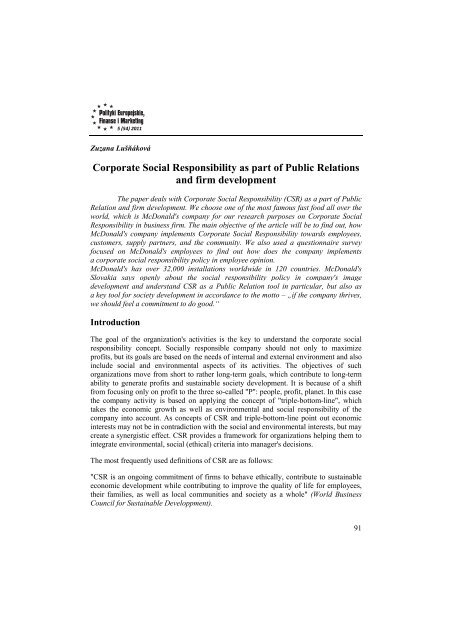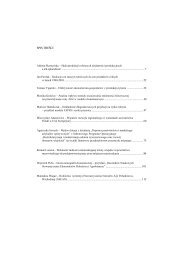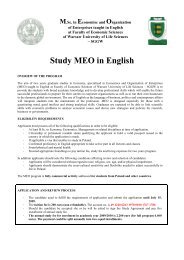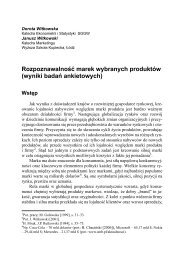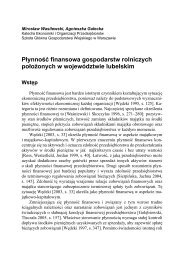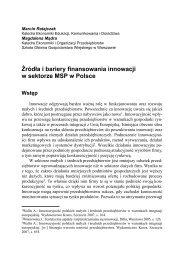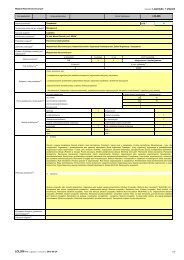Corporate Social Responsibility as part of Public Relations and firm ...
Corporate Social Responsibility as part of Public Relations and firm ...
Corporate Social Responsibility as part of Public Relations and firm ...
You also want an ePaper? Increase the reach of your titles
YUMPU automatically turns print PDFs into web optimized ePapers that Google loves.
5 (54) 2011<br />
Zuzana Lušňáková<br />
<strong>Corporate</strong> <strong>Social</strong> <strong>Responsibility</strong> <strong>as</strong> <strong>part</strong> <strong>of</strong> <strong>Public</strong> <strong>Relations</strong><br />
<strong>and</strong> <strong>firm</strong> development<br />
The paper deals with <strong>Corporate</strong> <strong>Social</strong> <strong>Responsibility</strong> (CSR) <strong>as</strong> a <strong>part</strong> <strong>of</strong> <strong>Public</strong><br />
Relation <strong>and</strong> <strong>firm</strong> development. We choose one <strong>of</strong> the most famous f<strong>as</strong>t food all over the<br />
world, which is McDonald's company for our research purposes on <strong>Corporate</strong> <strong>Social</strong><br />
<strong>Responsibility</strong> in business <strong>firm</strong>. The main objective <strong>of</strong> the article will be to find out, how<br />
McDonald's company implements <strong>Corporate</strong> <strong>Social</strong> <strong>Responsibility</strong> towards employees,<br />
customers, supply <strong>part</strong>ners, <strong>and</strong> the community. We also used a questionnaire survey<br />
focused on McDonald's employees to find out how does the company implements<br />
a corporate social responsibility policy in employee opinion.<br />
McDonald's h<strong>as</strong> over 32,000 installations worldwide in 120 countries. McDonald's<br />
Slovakia says openly about the social responsibility policy in company's image<br />
development <strong>and</strong> underst<strong>and</strong> CSR <strong>as</strong> a <strong>Public</strong> Relation tool in <strong>part</strong>icular, but also <strong>as</strong><br />
a key tool for society development in accordance to the motto – „if the company thrives,<br />
we should feel a commitment to do good.“<br />
Introduction<br />
The goal <strong>of</strong> the organization's activities is the key to underst<strong>and</strong> the corporate social<br />
responsibility concept. <strong>Social</strong>ly responsible company should not only to maximize<br />
pr<strong>of</strong>its, but its goals are b<strong>as</strong>ed on the needs <strong>of</strong> internal <strong>and</strong> external environment <strong>and</strong> also<br />
include social <strong>and</strong> environmental <strong>as</strong>pects <strong>of</strong> its activities. The objectives <strong>of</strong> such<br />
organizations move from short to rather long-term goals, which contribute to long-term<br />
ability to generate pr<strong>of</strong>its <strong>and</strong> sustainable society development. It is because <strong>of</strong> a shift<br />
from focusing only on pr<strong>of</strong>it to the three so-called "P": people, pr<strong>of</strong>it, planet. In this c<strong>as</strong>e<br />
the company activity is b<strong>as</strong>ed on applying the concept <strong>of</strong> "triple-bottom-line", which<br />
takes the economic growth <strong>as</strong> well <strong>as</strong> environmental <strong>and</strong> social responsibility <strong>of</strong> the<br />
company into account. As concepts <strong>of</strong> CSR <strong>and</strong> triple-bottom-line point out economic<br />
interests may not be in contradiction with the social <strong>and</strong> environmental interests, but may<br />
create a synergistic effect. CSR provides a framework for organizations helping them to<br />
integrate environmental, social (ethical) criteria into manager's decisions.<br />
The most frequently used definitions <strong>of</strong> CSR are <strong>as</strong> follows:<br />
"CSR is an ongoing commitment <strong>of</strong> <strong>firm</strong>s to behave ethically, contribute to sustainable<br />
economic development while contributing to improve the quality <strong>of</strong> life for employees,<br />
their families, <strong>as</strong> well <strong>as</strong> local communities <strong>and</strong> society <strong>as</strong> a whole" (World Business<br />
Council for Sustainable Developpment).<br />
91
"The integration <strong>of</strong> business practices <strong>and</strong> values in such a way that they contain<br />
interests <strong>of</strong> all stakeholders including consumers, employees, investors <strong>and</strong> the<br />
environment" (The <strong>Corporate</strong> <strong>Social</strong> <strong>Responsibility</strong> Newswire Service).<br />
A. B. Carroll definition already from 1979: "<strong>Corporate</strong> <strong>Social</strong> <strong>Responsibility</strong> includes<br />
economic, legal, ethical <strong>and</strong> any other expectations <strong>of</strong> society, which h<strong>as</strong> at that time<br />
from the organization."<br />
Howard R. Bowen wrote: "<strong>Social</strong> responsibility is a commitment <strong>of</strong> entrepreneurs to<br />
seek strategies to make such decisions or carry out such activities, which are desirable in<br />
terms <strong>of</strong> goals <strong>and</strong> values <strong>of</strong> our society."<br />
<strong>Corporate</strong> <strong>Social</strong> <strong>Responsibility</strong><br />
Source: http://www.industryplayer.com/corporate_social_responsibility.php<br />
There are <strong>part</strong>icipating groups in matters relating to <strong>Corporate</strong> <strong>Social</strong> <strong>Responsibility</strong>:<br />
1. owners, shareholders, investors,<br />
2. staff (employees),<br />
3. consumers,<br />
4. suppliers <strong>and</strong> business <strong>part</strong>ners,<br />
5. competition,<br />
6. Government,<br />
7. community.<br />
92
CSR in relation to the owners, shareholders <strong>and</strong> investors requires:<br />
1. clearer <strong>as</strong>sessment <strong>of</strong> annual reports,<br />
2. transparent accounting,<br />
3. alignment <strong>of</strong> activities with the expectations <strong>of</strong> shareholders,<br />
4. providing long-term stability <strong>of</strong> the company.<br />
CSR in relation to employees requires:<br />
1. to enable staff career,<br />
2. to improve their skills,<br />
3. to provide training,<br />
4. to ensure appropriate conditions relating to safety at work.<br />
CSR in relation to consumers requires:<br />
1. to ensure consumer satisfaction,<br />
2. to reduce the number <strong>of</strong> complaints,<br />
3. health <strong>and</strong> safety for consumers,<br />
4. adequate information in advertising.<br />
CSR in relation to the supplier requires:<br />
1. compliance with the conditions laid down in the contract,<br />
2. compliance with maturity dates,<br />
3. level playing field for potential suppliers.<br />
CSR in relation to competition requires:<br />
1. to respect rules <strong>of</strong> the competitive struggle,<br />
2. to respect ethical codes,<br />
3. common solution to some problems in the environment.<br />
CSR in relation to the community requires:<br />
1. commitments to invest in community programs,<br />
2. to develop human capital,<br />
3. contribute to the development <strong>of</strong> infr<strong>as</strong>tructure.<br />
CSR in relation to the Government requires:<br />
1. support <strong>and</strong> management <strong>of</strong> corporate philanthropy,<br />
2. provision <strong>of</strong> government posts,<br />
3. effective use <strong>of</strong> subsidies, grants from government.<br />
<strong>Corporate</strong> <strong>Social</strong> <strong>Responsibility</strong> in McDonald's company<br />
McDonald's company w<strong>as</strong> selected for the sixth time for inclusion in the Dow Jones<br />
World <strong>and</strong> Dow Jones North America Sustainability Indexes (DJSI). These indexes<br />
compare the companies that are industry leaders in a wide range <strong>of</strong> economic,<br />
environmental <strong>and</strong> social issues. McDonald's is one <strong>of</strong> the few f<strong>as</strong>t food traders, which is<br />
so highly acclaimed.<br />
93
DJSI indexes belong to the world's most prestigious stock indexes <strong>of</strong> socially responsible<br />
investors. This cl<strong>as</strong>sification reflects the expertise that the company creates long-term<br />
shareholder value in the strategic management <strong>of</strong> corporate social responsibility <strong>and</strong> the<br />
attendant opportunities <strong>and</strong> risks. „McDonald's inclusion in DJSI shows how our owners,<br />
operators, suppliers <strong>and</strong> company employees work together to continually improve<br />
performance“, said Bob Langer - vice president for corporate social responsibility. They<br />
try to drive sustainable, pr<strong>of</strong>itable growth <strong>of</strong> their company, they also contribute to<br />
a sustainable society.<br />
As the first we analyzed McDonald's <strong>Corporate</strong> <strong>Social</strong> <strong>Responsibility</strong> towards<br />
employees. The company puts great emph<strong>as</strong>is on staff in c<strong>as</strong>e <strong>of</strong> the possibility <strong>of</strong><br />
personal growth <strong>and</strong> development, because there st<strong>and</strong> the right skills <strong>and</strong> abilities <strong>of</strong><br />
workers behind the company success. The company is also b<strong>as</strong>ed on several values <strong>and</strong><br />
principles such <strong>as</strong> respect, open communication <strong>and</strong> equally substantial <strong>and</strong> pr<strong>of</strong>essional<br />
development support. An important factor is the fact that McDonald's is able to provide<br />
work for such groups <strong>of</strong> workers who face many difficulties by finding a job such <strong>as</strong><br />
young people without work experience, women with children or h<strong>and</strong>icapped persons.<br />
McDonald's is one <strong>of</strong> the leading employers <strong>of</strong> such workers in our country.<br />
An equally important component <strong>of</strong> CSR in relation to employees is their training <strong>and</strong><br />
further development. The company is responsible for the condition, because this factor<br />
attaches great importance, <strong>as</strong> it w<strong>as</strong> considered <strong>as</strong> a key article <strong>of</strong> company success.<br />
Next we realized the social responsibility examination towards other <strong>part</strong>icipating groups<br />
which are consumers (customers). McDonald's includes health <strong>and</strong> safety <strong>of</strong> customers<br />
among the primary interests. Therefore the company uses only products <strong>and</strong> raw<br />
materials that must meet the strictest safety <strong>and</strong> quality criteria <strong>and</strong> not at le<strong>as</strong>t they must<br />
be tested <strong>and</strong> approved by all relevant institutions. An important <strong>part</strong> is the use <strong>of</strong><br />
biotechnology in food, which affects global agriculture <strong>and</strong> food industry. Although<br />
some genetically modified ingredients are not considered harmful <strong>and</strong> dangerous,<br />
McDonald's company requires from its suppliers to use mainly natural <strong>and</strong> no<br />
genetically modified ingredients, which is important for their customers. In the<br />
company's ads it could be noted that the marketing is aimed at adult consumers <strong>and</strong> the<br />
company philosophy is also not to tamper with children. In the field <strong>of</strong> advertising to<br />
children the company follows not only national <strong>and</strong> international legislation, but also h<strong>as</strong><br />
its own strict criteria. The company belongs to a member <strong>of</strong> a voluntary initiative <strong>of</strong><br />
major manufacturers who are committed to restrict advertising aimed at children.<br />
There w<strong>as</strong> another aim <strong>of</strong> our research - the <strong>firm</strong> relations to supply <strong>part</strong>ners. The system<br />
places extraordinary dem<strong>and</strong> on all suppliers, with which McDonald's is very closely<br />
connected on implementing the principles <strong>of</strong> quality management. This company<br />
suppliers can become only sufficiently trained <strong>part</strong>ners, who must undergo intensive<br />
inspections regularly. Suppliers <strong>of</strong> raw meat must not only comply with technical <strong>and</strong><br />
sanitary requirements but also make sure to purch<strong>as</strong>e quality animals to the requirements<br />
<strong>of</strong> McDonald's <strong>and</strong> place emph<strong>as</strong>is on h<strong>and</strong>ling. Similarly, business <strong>part</strong>ners must<br />
comply with strict criteria <strong>of</strong> McDonald's.<br />
94
Than we also analyzed the corporate social responsibility <strong>of</strong> McDonald's in relation to<br />
the community. McDonald's is also involved quite heavily in the sponsorship <strong>of</strong> many<br />
activities, such <strong>as</strong> World Children's Day, held on 30 November in all 16 McDonald's<br />
restaurants in Slovakia. Thus obtained money goes to help children who must undergo<br />
treatment in hospitals. It will also help them to have a ple<strong>as</strong>ant stay, <strong>and</strong> improve<br />
treatments. McDonald's charity built family rooms in several hospitals in Slovakia - eg<br />
Children Hospitalin Bratislava, Childrens Faculty hospital in Kosice.<br />
Another charitable project that the company supports is „The House, where we are well“<br />
(this project is to provide better housing conditions for foster families caring for children<br />
who can not be raised in their biological family). The company is also <strong>part</strong>ner <strong>of</strong> the<br />
Olympic day run in Slovakia. It is a global event whose main purpose is to promote the<br />
sport idea - everyone can become <strong>part</strong> <strong>of</strong> the Olympic Movement. The b<strong>as</strong>ic philosophy<br />
<strong>of</strong> McDonald's w<strong>as</strong> to be (also with the franchisee) beneficial for the environment in<br />
which they operate. Many franchisees may decide to support local sports teams or school<br />
facilities, which will also be endorsed by the person satisfaction <strong>and</strong> commercial success.<br />
McDonald's company pays much attention to care about the environment in addition to<br />
other above mentioned are<strong>as</strong>. As the company attaches great importance to behave<br />
responsibly towards the environment, therefore it respects all the principles <strong>of</strong><br />
environmental protection <strong>and</strong> also leads its <strong>part</strong>ners <strong>and</strong> suppliers to that philosophy.<br />
Each <strong>of</strong> the McDonald's restaurants operates on the principle <strong>of</strong> environmental<br />
management aimed at minimizing the impact <strong>of</strong> business activities on the environment.<br />
Key principles <strong>of</strong> environmental management in this company may include efficient use<br />
<strong>of</strong> resources, reducing emissions, reducing solid w<strong>as</strong>te not only in their own restaurants,<br />
but also by suppliers, use <strong>of</strong> secondary raw materials <strong>and</strong> friendly technologies use in<br />
terms <strong>of</strong> machinery <strong>and</strong> used equipment. The company also makes certain environmental<br />
me<strong>as</strong>ures. And therefore all possible alternatives are always considered in their decisionmaking,<br />
which take <strong>part</strong>icular <strong>as</strong>pects <strong>of</strong> environmental protection together with the<br />
appropriateness <strong>and</strong> cost criteria in decision-making process into account.<br />
Another aim <strong>of</strong> our research w<strong>as</strong> to find out the relations between the <strong>firm</strong> <strong>and</strong> its<br />
suppliers. Objectives that the company monitors in the field <strong>of</strong> the environment are <strong>as</strong><br />
follows:<br />
• efforts to reduce energy <strong>and</strong> water consumption, raw materials, reducing packaging<br />
volume <strong>and</strong> weight,<br />
• to use recycled materials wherever appropriate,<br />
• me<strong>as</strong>ure to reduce emissions, such <strong>as</strong> optimizing the distribution <strong>of</strong> goods, control <strong>of</strong><br />
water w<strong>as</strong>te,<br />
• to minimize the amount <strong>of</strong> unsorted w<strong>as</strong>te: incre<strong>as</strong>ing efficiency <strong>of</strong> pre-sorting <strong>of</strong> w<strong>as</strong>te<br />
<strong>and</strong> extending the number <strong>of</strong> sorted fractions whenever possible.<br />
The company is also committed to continuous review, evaluation <strong>and</strong> also improving the<br />
environmental program to ensure that it practices the best possible solution given the<br />
environmental conditions <strong>of</strong> its restaurants, which will also be in accordance with<br />
legislative requirements. In addition with this commitment, McDonald's dedicates the<br />
95
space for staff training in this area, <strong>and</strong> also communicates with vendors to incre<strong>as</strong>e their<br />
awareness <strong>of</strong> environmental protection.<br />
The company expects identification with environmental issues from its employees but<br />
also that employees are fully aware <strong>of</strong> just how important is compliance with the<br />
directives, regulations <strong>and</strong> also practices <strong>as</strong> well <strong>as</strong> awareness <strong>of</strong> the impact <strong>of</strong> own<br />
activities on the environment. McDonald's is open to pro-active approach <strong>and</strong> submitting<br />
proposals for improvements in environmental policy.<br />
Some companies prefer short-term benefit <strong>of</strong> non-compliance with environmental<br />
protection, resulting in undue burdens on the nature <strong>and</strong> quality <strong>of</strong> life for future<br />
generations. The McDonald's company's objective is to protect the environment in such<br />
a way that future generations will be maintained natural diversity <strong>of</strong> nature <strong>and</strong> its<br />
components. The company strives to be a good example regarding the application <strong>of</strong><br />
higher st<strong>and</strong>ards relating to environmental protection.<br />
Questionnaire survey on the implementation <strong>of</strong> the <strong>Corporate</strong> <strong>Social</strong><br />
<strong>Responsibility</strong> in McDonald's<br />
In this section we used a questionnaire survey focused on McDonald's<br />
employees to find out how does the company implements a corporate social<br />
responsibility policy in its employee opinion. The tested sample represented 324<br />
McDonald's employees. The questionnaire w<strong>as</strong> sent through the mail <strong>and</strong> e-mail <strong>and</strong> w<strong>as</strong><br />
replied by 211 employees from the whole number <strong>of</strong> respondents. All these<br />
questionnaires were usable.<br />
Politics at work:<br />
1. Does your <strong>firm</strong> encourage employees to develop skills, abilities <strong>and</strong> long-term career?<br />
The questionnaire survey results that McDonald's managers are conducive to the<br />
development <strong>of</strong> qualification potential <strong>of</strong> their subordinates (90%). The remaining 10%<br />
expressed the view that the long-term career development <strong>and</strong> pr<strong>of</strong>essional growth<br />
would require more initiative from the employers.<br />
2. Do you inform your employees about important matters? (Do you inquire with them?)<br />
According to the survey 20% <strong>of</strong> McDonald's managers take the views <strong>of</strong> junior staff into<br />
account, while 80% <strong>of</strong> managers respect the opinions <strong>of</strong> subordinates, to some extent or<br />
not respect at all.<br />
3. Does your enterprise appropriate me<strong>as</strong>ures for health, safety <strong>and</strong> welfare, to provide<br />
sufficient protection for employees?<br />
As we found out 73% <strong>of</strong> respondents consider undertaking me<strong>as</strong>ures for health <strong>and</strong><br />
safety <strong>of</strong> their employees to be satisfactory, 27% would take some me<strong>as</strong>ures to improve<br />
them.<br />
96
Environmental policy:<br />
4. Have you ever tried to reduce your business impact on environment in terms <strong>of</strong>:<br />
a) Energy Savings<br />
70% <strong>of</strong> managers considered the environment impact to be minimal, while 30% <strong>of</strong><br />
respondents found some reserves in environmental policy.<br />
b) W<strong>as</strong>te minimization <strong>and</strong> recycling<br />
As it is expressed in the light <strong>of</strong> environmental program objectives on the issue <strong>of</strong> w<strong>as</strong>te<br />
minimization, McDonald's is successfully fulfilling all its resolutions.<br />
5. Can your company save money by reducing the negative impact on environment?<br />
B<strong>as</strong>ed on the results the questionnaire survey up to 90% <strong>of</strong> the respondents considered if<br />
more business-oriented <strong>firm</strong>s save the environment, it can also minimize their costs.<br />
6. Do you consider possible impacts on the environment by the development <strong>of</strong> new<br />
products <strong>and</strong> services?<br />
In the decision process <strong>of</strong> the company 40% <strong>of</strong> the surveyed managers consider all the<br />
effects <strong>and</strong> potential environmental impacts related to products production <strong>and</strong><br />
innovation. On the other h<strong>and</strong>, 30% <strong>of</strong> managerial staff thinks that the development <strong>of</strong><br />
new products should have some implications for the environment. 30% <strong>of</strong> respondents<br />
are not aware <strong>of</strong> the possible production effects on the environment.<br />
Trade policy:<br />
7. H<strong>as</strong> your company methods to determine the quality <strong>of</strong> all its contracts, negotiations<br />
<strong>and</strong> promotion?<br />
90% <strong>of</strong> respondents think that the company h<strong>as</strong> quality me<strong>as</strong>ures for consumer<br />
protection <strong>and</strong> provides only truthful information about their products. Conversely 10%<br />
<strong>of</strong> the managers expressed disapproval with these methods <strong>and</strong> me<strong>as</strong>ures, <strong>and</strong> requires<br />
some improvements.<br />
8. Does your company provide clear <strong>and</strong> accurate information, products <strong>and</strong> services<br />
labeling?<br />
80% <strong>of</strong> respondents are <strong>of</strong> the opinion that McDonald's treated fairly <strong>and</strong> responsibly for<br />
its business <strong>part</strong>ners <strong>as</strong> well <strong>as</strong> consumers <strong>and</strong> suppliers. 20% <strong>of</strong> respondents do not have<br />
knowledge about the impacts <strong>of</strong> <strong>firm</strong> trade policy.<br />
9. Does your company provide timely payment <strong>of</strong> invoices for the suppliers?<br />
78% <strong>of</strong> respondents consider their relationships with supplier <strong>part</strong>ners to be very fair.<br />
Opposite view have 22% <strong>of</strong> respondents who were unable to comment on this issue.<br />
10. Does your <strong>firm</strong> register <strong>and</strong> resolve consumer's, supplier's <strong>and</strong> business <strong>part</strong>ner's<br />
complaints about your company?<br />
Since the company is focused on the needs <strong>and</strong> desires <strong>of</strong> its customers, trying to meet<br />
their needs in each direction, hence their complaints, suggestions <strong>and</strong> recommendations<br />
addressed immediately.<br />
97
Policy to the community:<br />
11. Does your company <strong>of</strong>fer education or job training opportunities to people from the<br />
local community? (eg, apprenticeships or work experience for young people or<br />
disadvantaged groups?)<br />
The majority <strong>of</strong> respondents believe that McDonald's company provides training to<br />
young people, <strong>as</strong> well <strong>as</strong> for some disadvantaged groups (disabled, mothers with<br />
children, etc.). On the other h<strong>and</strong>, 30% <strong>of</strong> managers h<strong>as</strong> the opposite view <strong>and</strong> believe<br />
that relations with the community would need to be improved. Other respondents did not<br />
know to specify his reply.<br />
12. Does your company regularly provide financial support for projects <strong>and</strong> community<br />
activities? (charity donations, grants, sponsorship ...)<br />
Staff in leadership positions considered the financial support for local community to be<br />
excellent. 10% <strong>of</strong> surveyed respondents do not know what activities the company<br />
supports.<br />
Company Value:<br />
13. Have you clearly defined your business value <strong>and</strong> management principles?<br />
All interviewed respondents agreed that the company h<strong>as</strong> clearly defined its values <strong>and</strong><br />
priorities.<br />
14. Do you communicate your company's value to customers, business <strong>part</strong>ners,<br />
suppliers <strong>and</strong> other stakeholders? (eg, business presentations, marketing materials or<br />
informal communications)<br />
Half <strong>of</strong> respondents think that the company's values are well engraved into the customer,<br />
business <strong>part</strong>ners <strong>and</strong> suppliers consciousness. 30% <strong>of</strong> the McDonald's managers believe<br />
that there are me<strong>as</strong>ures to get the values into the consciousness <strong>of</strong> these groups. 20% do<br />
not know whether the <strong>part</strong>icipating groups are sufficiently aligned with those value.<br />
15. Do your employees know the company's value <strong>and</strong> its management principles?<br />
The bulk <strong>of</strong> the respondents is identical with the view that a company's employees are<br />
familiar with the management principles <strong>and</strong> company value. 20% <strong>of</strong> employees see the<br />
gaps in knowledge about the values <strong>of</strong> company.<br />
16. Does your company train workers about the importance <strong>of</strong> your company's value <strong>and</strong><br />
principles <strong>of</strong> management?<br />
90% <strong>of</strong> interested respondents considered staff training to be important. 10% <strong>of</strong><br />
respondents, however, h<strong>as</strong> another view. That percentage also expressed that it would be<br />
necessary to pay greater attention to staff training.<br />
98
Conclusion<br />
As we can see there are many benefits that CSR <strong>of</strong>fer to organizations. But the problem<br />
still remains - detection, quantification <strong>and</strong> <strong>as</strong>sessment <strong>of</strong> these benefits. The main<br />
advantages <strong>of</strong>fered by the implementation <strong>of</strong> CSR throughout society include preserving<br />
natural resources <strong>and</strong> ecosystem or improving quality <strong>of</strong> life.<br />
Benefits <strong>of</strong> implementing the concept <strong>of</strong> CSR within an organization can be divided into<br />
moral <strong>and</strong> economic. Moral benefits are non-financial nature, but in the longer term they<br />
can make a positive impact on management <strong>and</strong> financial resources <strong>of</strong> the organization.<br />
Moral benefits bring rarely gains for the organization immediately it does not mean that<br />
they are not important. Such benefits can include incre<strong>as</strong>ing br<strong>and</strong> value, reputation<br />
improving, natural resources preserving, enhancing human capital <strong>and</strong> building credible<br />
relationships with suppliers <strong>and</strong> customers. The economic benefits include better access<br />
to capital through socially responsible investing, reducing costs in the context <strong>of</strong> good<br />
environmental practice <strong>and</strong> improve employee productivity by incre<strong>as</strong>ing their<br />
satisfaction <strong>and</strong> skills.<br />
References<br />
1. BUSSARD, A. – NARKUŠ, M. – BUNČÁK, M. – MARČEK, E.: <strong>Corporate</strong><br />
<strong>Social</strong> Responsbility (Spoločensky zodpovedné podnikanie). Foundation<br />
Integra, Foundation Pontis, PANET, Bratislava 2005.<br />
2. CARROLL, A. B.: ‘A Three-Dimensional Conceptual Model <strong>of</strong> <strong>Corporate</strong><br />
Performance,’ Academy <strong>of</strong> Management Review, 1979. In: Carrol A.B.:<br />
A Guide to <strong>Corporate</strong> <strong>Social</strong> <strong>Responsibility</strong> (CSR)<br />
3. ARCHIE, B. CARROLL, ‘A Three-Dimensional Conceptual Model <strong>of</strong><br />
<strong>Corporate</strong> Performance,’ Academy <strong>of</strong> ManagementReview, 1979, In: Carrol<br />
A.B.: A Guide to <strong>Corporate</strong> <strong>Social</strong> <strong>Responsibility</strong> (CSR)<br />
4. CSR Europe: European Roadmap for Businesses, Towards a Sustainable <strong>and</strong><br />
Competitive Enterprise, Dostupné na http://www.csreurope.org/pages/en/<br />
/roadmap.html<br />
5. SMITH, S.: Navigating The Stakeholder <strong>Relations</strong> Continuum. In: Leading<br />
Perspectives, 2004. p.: 18 – 19.<br />
6. TRNKOVÁ, J.: What does it mean <strong>Corporate</strong> <strong>Social</strong> <strong>Responsibility</strong>? (Co<br />
znamená společenská odpovědnost firem?). AISIS, 2005.<br />
7. FRIEDMAN, M.: The <strong>Social</strong> <strong>Responsibility</strong> <strong>of</strong> Business is to Incre<strong>as</strong>e its<br />
Pr<strong>of</strong>its, The New York Times Magazine, 13. september 1970<br />
8. KLEIN, N.: No Logo: Taking Aim at the Br<strong>and</strong> Bullies. Canada, 2000.<br />
9. CONROY, M.: Br<strong>and</strong>ed! How the 'Certification Revolution' is Transforming<br />
Global Corporations, New Society Publisher, 2007. ISBN: 9780865715790<br />
99
Summary<br />
<strong>Social</strong> responsibility <strong>and</strong> ethics h<strong>as</strong> become the key <strong>of</strong> marketing just when it also<br />
becomes the topic <strong>of</strong> customer interest <strong>and</strong> organization <strong>Corporate</strong> <strong>Social</strong> <strong>Responsibility</strong><br />
becomes a tool to satisfy customer requirements. This era occurred when customers<br />
gained greater access to information about the organizations practices <strong>and</strong> there also<br />
grew a number <strong>of</strong> global environmental <strong>and</strong> social problems. Organizations behavior in<br />
the broadest sense began to have an impact on how people perceive their products <strong>and</strong><br />
services.<br />
That social responsibility h<strong>as</strong> become one <strong>of</strong> the major trends in marketing does not<br />
mean that it's the only way to achieve success in the short term. Marketers may get into<br />
situations where they will face the choice dilemma between pr<strong>of</strong>itability <strong>and</strong> customers'<br />
desire for social benefit. "<br />
Contact address<br />
Ing. Zuzana Lušňáková, PhD.,<br />
De<strong>part</strong>ment <strong>of</strong> Marketing, Faculty <strong>of</strong> Economics <strong>and</strong> Management,<br />
Slovak University <strong>of</strong> Agriculture,<br />
Tr. A. Hlinku 2,<br />
949 76 Nitra, Slovakia,<br />
tel. 00421 37 641 4171,<br />
e-mail: zuzana.lusnakova@fem.uniag.sk<br />
100


